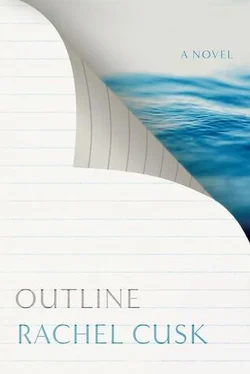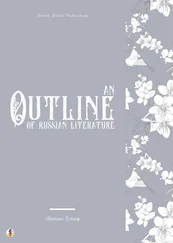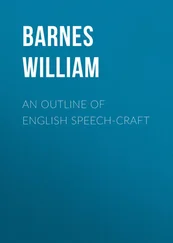He got out of the car and I watched him make his way, with his slightly waddling walk, to the water’s edge, where he bent down to pull out the dripping rope. We repeated the previous day’s routine, me waiting while he made things ready on deck and then the courtly pas de deux whereby we changed places, the rope passing between our hands. When everything was done he started the engine and we chugged away from the mooring, from the heat of the jetty and the car park that looked like a field of brilliant metals in the dust, the sun flashing and glinting in the dark windows. We did not go so fast, this time, as the day before; whether through consideration or because, having demonstrated his power, my neighbour could now conserve his energies, I did not know. I sat on the padded bench, his naked back once more before my eyes, the wind scouring the deck, and thought of the strange transitions from enchantment to disenchantment and back again that moved through human affairs like cloudbanks, sometimes portentous and grey and sometimes mere distant inscrutable shapes that blotted out the sun for a while and then just as carelessly revealed it again. My neighbour called back to me, over the noise of the engine, that we were just now passing the promontory and temple of Sounion, from whose cliffs, in Greek legend, the father of Theseus threw himself when he saw his son’s ship returning to land wearing the black sail that conveyed, wrongly, the news of his death. I looked and saw a ruined temple in the distance like a little broken diadem on the hilltop, just before the land tumbled down to meet the sea.
Mixed messages, my neighbour continued, as we approached the cove and started to slow down, were a cruel plot device that did sometimes have their counterpart in life: his own brother, the one who had died a few years ago, a dear and generous person, suffered his fatal heart attack while waiting for a friend to come to lunch. He had given the man — who happened, moreover, to be a doctor — the wrong address, for he had just moved into a new apartment and hadn’t yet memorised the full details, and so while his friend was searching for him in a street of a similar name on the other side of town, he was lying on his kitchen floor with his life ebbing away, a life, what’s more, that apparently could easily have been saved had he been reached in time. His older brother, the reclusive Swiss millionaire, had responded to these events by having a complex system of alarms installed in his own apartment, for though he was a man who would never forget his own address he was also entirely friendless and miserly and had never had a lunch guest in his life; and indeed when his own heart attack came — which their family medical history made a likelihood — he simply pressed the nearest emergency button and within minutes was in a helicopter, being whisked to a top cardiac unit in Geneva. Sometimes it was as well, he said — and he was thinking of Theseus’s father here — not to take no for an answer, almost as a point of principle.
I said that, on the contrary, I had come to believe more and more in the virtues of passivity, and of living a life as unmarked by self-will as possible. One could make almost anything happen, if one tried hard enough, but the trying — it seemed to me — was almost always a sign that one was crossing the currents, was forcing events in a direction they did not naturally want to go, and though you might argue that nothing could ever be accomplished without going against nature to some extent, the artificiality of that vision and its consequences had become — to put it bluntly — anathema to me. There was a great difference, I said, between the things I wanted and the things that I could apparently have, and until I had finally and forever made my peace with that fact, I had decided to want nothing at all.
My neighbour was silent for a considerable length of time. He steered the boat into the deserted cove, where the seabirds stood on the rocks and the water whirled in its little inlet, and took the anchor out of its compartment. He leaned over me to cast it over the side, and slowly paid out the chain until he felt it resting on the bottom.
‘Has there really been no one?’ he asked.
There had, I said, been someone. We were still very good friends. But I hadn’t wanted to carry on with it. I was trying to find a different way of living in the world.
Now that we had come to a stop, the heat had intensified. The sun shone directly on the padded bench where I sat, and the only patch of shade was directly beneath the canopy, where my neighbour stood with his arms folded, leaning against the side of the boat. It would have been awkward to go and stand there with him. I could feel the skin on my back burning. Just then he moved, but it was only to replace the lid of the compartment where he kept the anchor, and he returned to his original position. He understood, he said, that I was still in a great deal of pain. Being with me had reminded him of episodes in his own life he had not thought of for many years, and was causing him to revisit some of these feelings himself. His first marriage, he said, had really come to an end on a day when they had had a large family party, a lunch to which all the relatives on both sides had been invited and which they held at their home in the suburbs of Athens, a house big enough and grand enough to accommodate everyone. The party had been a success, everything had been eaten and drunk and cleared away and the guests had finally departed, and my neighbour, exhausted, had lain down on the sofa to take a nap. His wife was in the kitchen doing the last of the dishes, the children were out playing somewhere, there was a cricket match making its slow progress on the television, and amidst this scene of domestic contentment my neighbour fell into a profound sleep.
For a moment he was silent, leaning against the side of the boat, his fleshy white-haired arms with their ropes of veins folded across his chest.
‘I believe,’ he resumed presently, ‘that what my wife did then was premeditated, that she saw me lying there and intended to force a confession from me by surprise. She came to the sofa and shook me by the shoulder, waking me up from this very deep sleep, and before I even knew where I was or had time to think, she asked me whether I was having an affair. In my bewilderment I was unable to make a sufficient pretence in time, and though I don’t think I actually admitted it, I left enough room for doubt to confirm her suspicions; and from there’, he said, ‘grew the argument that ended our marriage and caused me, shortly afterwards, to leave the house. I find that I still can’t forgive her,’ he said, ‘for the way in which she deliberately used a moment of vulnerability to extract something from me of which she already had a pre-formed idea. It still’, he said, ‘makes me angry, and in fact I believe that it gave the shape to everything that came afterwards, to her righteous indignation and her refusal to accept any blame whatsoever for our situation, and to the punishing way she treated me in the course of our divorce. And of course no one’, he said, ‘could say that she was wrong for simply waking me from a nap, even though there was no reason to wake me and I would have slept on for hours. Yet I believe, as I say, that it was precisely this underhand act that gave birth to her vitriol, for people are at their least forgiving when they themselves have been underhand, as though they would exact their innocence from you at any price.’
I listened to this confession, if confession it was, in silence. I found that I was disappointed in him, and that discovery made me feel, for the first time, afraid of him. Some people, I said, might find that a slightly self-serving accusation. At least she woke you up, I said: she might have just cudgelled you to death then and there.
Читать дальше












